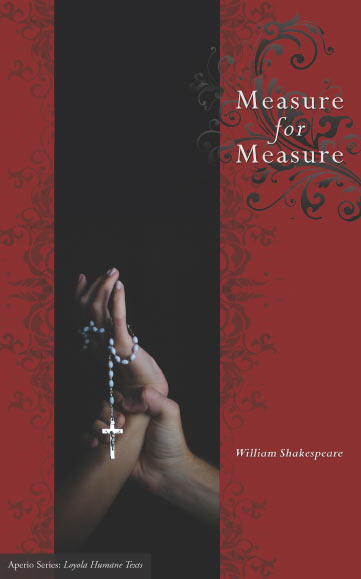Shakespeare presents love, sex and passion as almost invariably dangerous.
Measure for Measure
I argue that these ‘forces of the will’ sex, passion and love are in themselves innocent in Shakespeare’s Measure For Measure. It is when they are criminalized and demonised by various institutions, namely law and religion, when society tries to control and legislate natural human emotions that they become dangerous. The first instance of ‘love’ that occurs within the play is the love between Claudius and Juliet. The nature of the love between Claudius and Juliet is innocent and consensual. The two are engaged to be married, they is nothing innately amoral or dangerous about this. It is when the institutions of law and religion intervene and attempt to separate love from sex, and demonise one that it becomes dangerous. This will be discussed in greater depths later. Claudius is however, to be executed under Angelo’s rule for impregnating Juliet.
The second instance of ‘love’ in the play is the familial love between Claudius and his young sister Isabella. The conflict begins early in the play, on Isabella’s first encounter with Angelo. Critics have often seen Isabella as a wholesome innocent nun-to-be; an individual who pleads for Claudius’s life and is met with Angelo’s debased corrupt proposition, to give her chastity, in return for her brother life. Isabella responds however, “More than our brother is our chastity.” (3:1) In her desire to protect herself against corruption she rejects not only sex, but all intercourse with men and most forms of intercourse with women; she rejects the world, including love, and, in doing so, compromises her own full humanity.

Angelo
Angelo embodies corruption. His strict moral adherence is not dissimilar to the puritans who were around during the time of a measure for measure. In his stringent desire of order and morality he has had to separate love and sex. The institution of religion deeming such natural passions as amoral. This has had a detrimental effect on the encoding of such emotions in his brain. When Angelo finds himself attracted by Isabella, what is to prevent him simply declaring his love for her? He is the kind of man she admires. If he freely pardoned her brother he would stand in her good grace. But for him love and lust have become separated as good and evil. When, in his desire for Isabella, he is forced to recognize his own humanity, he can only recognize it as sinful lust. Wilson Knight describes this, “Sexual desire has long been anathema to him, so his warped idealism forbids any healthy love. Good and evil change places in his mind,” (The Wheel of Fire 87-8.) 1 Angelo is brainwashed into identifying his lustful feelings as sinful, not the blossoms of love. Carl Jung the eminent psychologist gives a name to Angelo’s condition. He calls it 'enantiodromia:’
Virtuousness is always inwardly compensated by a great tendency towards baseness; and how many profligates are there who inwardly preserve a mawkish virtue and moral megalomania? One completely forgets that one can most miserably be carried away, not only be a vice, but also by a virtue. There is a fanatic, orgiastic self-righteousness which is just as base and which entails just as much injustice and violence as a vice. (Psychology 142) 2
Corruption
The second incidence of sex within the play is linked intrinsically to a situation of passion, the passion of Angelo for Isabella. “ Dost thou desire her foully for those things that make her good?” (2:2) This dire moral situation requires intervention from the Duke. The Duke in his desire to clear up Venice of sin, as he has been lax in enforcing certain laws and feels it would be unacceptable to begin now, hires Angelo, who he knows to be morally strict “ I have deliver’d to Lord Angelo, a man of stricture and firm abstinence.”(1:3) To take rule. He stays disguised as a friar to watch Angelo. In the enforcement of law judges are required to use compassion and sensitivity, the concept of Christian clemency. The Duke also requires Angelo not to punish others for sins in which “he is familiar,” i.e.: sins he is guilty of.
The Duke is a morally questionable character. His secret test of Angelo’s ability to rule seems to show he is in possession of an admirable moral conscience. However, this view is challenged later in the play. After Isabella is propositioned by Angelo the Duke suggests the ‘bed trick’ a traditional comedic ploy of Shakespeare’s, which leads an unsuspecting victim to believe they are n bed with one person whilst in the guise of darkness it is another altogether.
The Duke introduces Marianne, formerly betrothed to Angelo, but he deserted her once her dowry was lost in a shipwreck in which her brother died. A predictable interchange of Isabella and Marianne in the ‘bed trick’ leads Angelo to believe he has fornicated with Isabella. He sends warrant for Claudius’s execution regardless. In this instance the Duke acts in a questionable manner. He effectively prostitutes Marianne to Angelo, making himself a bawd. Isabella who allows this to occur is made a bawd and becomes akin to mistress overdone. In the dichotomy the play sets up between nunnery and brothel, it is Mistress Overdone, a bawd, who exemplifies womanly compassion and Christian charity by taking in Lucio's bastard. This act of charity is more than we can say for Isabella who acts bizarrely throughout the play.

guilt and sin
Angelo and Isabella are not entirely different, whilst Angelo has been indoctrinated into believing that love is sinful and lustful, Isabella is resorting to going into a nunnery, a punishment threatened to Hermia by Theseus in A Midsummer Nights Dream, to escape men, whom she fears may arouse a debased feeling of sinful godless desire. Each of these characters are engaged in a self denial in which the neglect and repression of emotion results, for Angelo, in debased propositions to young nuns and the order of a merciless execution, of Claudius, a man who acknowledges his lusts. Another shared trait of Isabella and Angelo is that they are both dedicated to institutions that they do not understand. Isabella agrees with Angelo’s sentence on her brother’s life, “O just but severe law!” (2:2) The complete indulgence of ones passions, the rejection of the deadly sin of gluttony, the dedication to personal satisfaction can be deemed the shorthand for the philosophy of Satanism. Is Claudius guilty of satisfying a passion for his fiancée, wife to be? Indeed, he is, therefore sinful and primeval and needs to be executed.
During the time Shakespeare wrote A Measure For Measure there were political tensions in England. Elizabeth 1 was reaching the end of her monarchy, and there were transitional fears as Kingship was passed to the Scottish James 1. These tensions are represented in the play through the theme of just and fair rule explored through the characters of Angelo and the Duke. Angelo and Isabella are not entirely different, whilst Angelo has been indoctrinated into believing that love is sinful and lustful, Isabella is resorting to going into a nunnery, a punishment threatened to Hermia by Theseus in A Midsummer Nights Dream, to escape men, whom she fears may arouse a debased feeling of sinful godless desire. Each of these characters are engaged in a self denial in which the neglect and repression of emotion results, for Angelo, in debased propositions to young nuns and the order of a merciless execution, of Claudius, a man who acknowledges his lusts. Another shared trait of Isabella and Angelo is that they are both dedicated to institutions that they do not understand. Isabella agrees with Angelo’s sentence on her brother’s life, “O just but severe law!” (2:2) The complete indulgence of ones passions, the rejection of the deadly sin of gluttony, the dedication to personal satisfaction can be deemed the shorthand for the philosophy of Satanism. Is Claudius guilty of satisfying a passion for his fiancée, wife to be? Indeed, he is, therefore sinful and primeval and needs to be executed.
During the time Shakespeare wrote A Measure For Measure there were political tensions in England. Elizabeth 1 was reaching the end of her monarchy, and there were transitional fears as Kingship was passed to the Scottish James 1. These tensions are represented in the play through the theme of just and fair rule explored through the characters of Angelo and the Duke.
comedy?
A Measure for Measure is considered a ‘comedy’ by the first folio, it ends with marriage, the Duke’s disguise is discarded and his true identity is revealed, and order is restored. Certain Shakespeare critics have disregarded the play as being a pointless exercise, the only mar in Shakespeare’s genius. Recent readings have led certain critics to refer to it as a ‘problem play,’ because it leaves us with moral issues, which remain ambiguous to the end, and because it refuses to be neatly classified. Angelo seems to be as morally rigid as ever; Isabella is unspoken in the face of the Duke's marriage proposal; the Duke has used subterfuge to accomplish his aims; and Mariana is married to someone who doesn't want her. Is this, critics ask, the stuff of tragedy or comedy?
In A Measure for Measure the political and religious tensions arise over the controversy of love, sex and passion. Religion heavily infiltrates ideas about such practises and it dictates its version of morality. The laws of God and the laws of man are intertwined. Love, sex and passion are emotions around which Shakespeare examines corrupt institutions.








